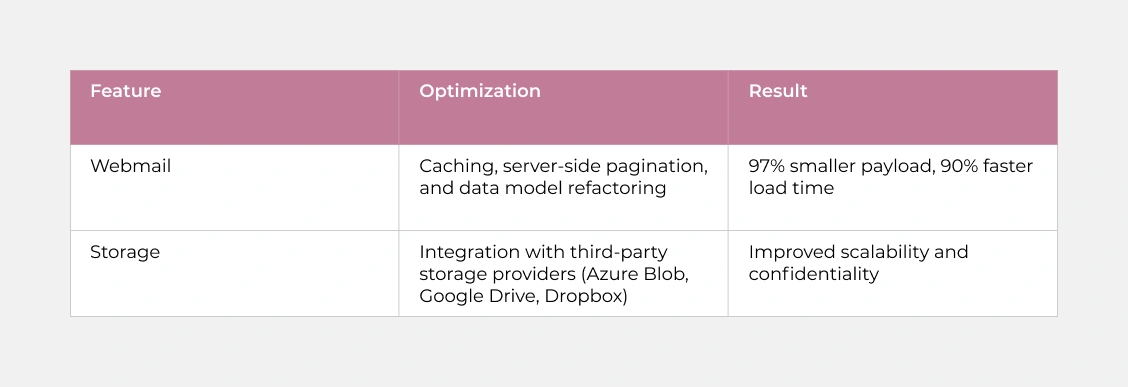Modernizing Enterprise-Level Software to Meet the Demands of a Global Userbase
-
Industry
ERP for the Printing industry
-
Project type
Software Modernization
Softacom in Numbers
unit types we implemented
Webmail load time reduced
Data payload size reduced
Description
A European company specializing in print industry software and marketing automation reached out to Softacom to modernize their enterprise-level platform. They focus their IT efforts and expertise on a narrow niche. Their solutions are specifically customized for printing businesses, such as offset, digital, wide-format, packaging, publishing, screen-print, photo labs, and corporate print operations.
The solution offers an all-in-one solution that enables users to automate production and keep track of processes from a single environment. With this solution, users get smart quoting for print, document, and commercial management, production flow, accounting, CRM, and business intelligence capabilities.
The company wanted to implement multi-functional management with support for both metric and Anglo-Saxon formats based on currency. They also sought to optimize webmail and storage management.
The purpose of the project was to improve UX across regions, ensure data accuracy and consistency. Also, they wanted to add support for internationalization and localization and enhance overall system flexibility.
As the company expanded into new regions, it became clear that their internal systems were not keeping up with the demands of a global user base. Users from different countries faced confusion due to inconsistent formatting of numbers, dates, and currencies. This led to input errors, frustration, and extra load on customer support.
- Users were confused by the inconsistent formatting of numbers, dates, and currencies, which led to input errors, especially in the US and UK, where users expected USD, inches/pounds, and the MM/DD/YYYY format.
- The international user experience was poor, making the system harder to use for global teams.
- Because of data inconsistency across different systems, the client faced operational disorganization.
- Core modules like webmail and file storage struggled to scale — the email search slowed down with growing volume, and file storage was limited to the client’s own servers.
- These issues also led to the company experiencing difficulties expanding into new markets.
Project Team Size
- PM
- .NET Full Stack Developer

Solutions
The Main Challenges
The lack of full localization and multi-currency support made onboarding English-speaking teams difficult and slowed down daily operations.
For example, the system was originally tailored for the European market, with Euro pricing, metric units, and the DD.MM.YYYY date format. But as the company began expanding into the US and UK, this created friction. American and British users expected USD pricing, measurements in inches and pounds, and dates in MM/DD/YYYY format. The lack of localization led to confusion, input errors, and manual workarounds like currency conversion or reformatting dates.
At the same time, core functionalities like webmail and storage needed performance improvements to support a growing business.
How Softacom Resolved the Main Challenges
To address these issues, we introduced a multi-functional management system designed for flexibility and global compatibility.
We implemented formatting logic that adapts numbers, dates, and currencies based on the currency used by the back office, switching between metric and Anglo-Saxon systems.
We added support for multiple units of measurement, currencies, and languages. The platform originally supported European markets, and we extended it with full English-language support.
In total, we implemented support for 100+ unit types, not just the usual metric and imperial standards. This depth was required due to the industry-specific nature of the system, covering highly specialized formats used in printing, packaging, and logistics.
In addition, we conducted thorough testing, code reviews, and optimizations for several key features:
- Webmail management: Before implementing caching, our developer discovered that the data model used to retrieve emails was highly redundant. For example, loading just 267 emails resulted in a 6.4 MB payload and took over 10 seconds on the client side. After reworking the data model, the payload was reduced to just 191 KB, and the loading time dropped to around 1 second. Our team reduced payload size by over 97% and cut load times by 90%, dramatically improving the responsiveness of the Webmail feature.
- Storage management: optimized for better confidentiality and scalability. We also implemented support for third-party storage providers, such as Azure Blob Storage, Google Drive, and Dropbox. In the legacy version, all files had to be stored on the client’s own server, which created maintenance overhead and scaling issues. By integrating cloud storage options, we removed the burden of local storage management and enabled clients to store files in their own secure environments. This not only improved scalability but also enhanced confidentiality, since each user’s files now remain in their personal cloud space.
To identify hidden performance bottlenecks, we used internal tools and AI-assisted analyzers. These tools help us detect issues before they impact users, allowing us to optimize key areas like email processing, storage access, and onboarding flows with precision.
Together, these upgrades helped the company create a more consistent, user-friendly experience across borders and laid the technical foundation for confident global growth.

Also, our team gained a deep understanding of the project application, its architecture, infrastructure, and technical specifics. We transferred this knowledge to the client team so that they will be more confident and efficient with future development tasks.
Additionally, we analyzed further optimization opportunities and suggested several development paths for key system modules. As part of this effort, we prepared detailed technical specifications for the next iterations, helping the client plan future work with clarity and confidence.
Outcomes
The project is still ongoing but we have the first results:
- The company benefits from an implemented multi-functional management system that includes support for multiple units of measurement, multi-currency handling, and extended language support, including a full English version of the system tailored for US and UK users.
- Our development team ran smoke testing on all completed features and bug fixes to ensure quality and stability across the system. This laid the foundation for smoother global operations.
- The platform now supports external cloud storage providers (Azure Blob, Google Drive, Dropbox), which removed the burden of managing on-premise storage and improved both scalability and confidentiality.
- Refactoring the email data model, adding caching, and implementing server-side pagination reduced payload size by 97% and cut Webmail load time by 90%.







